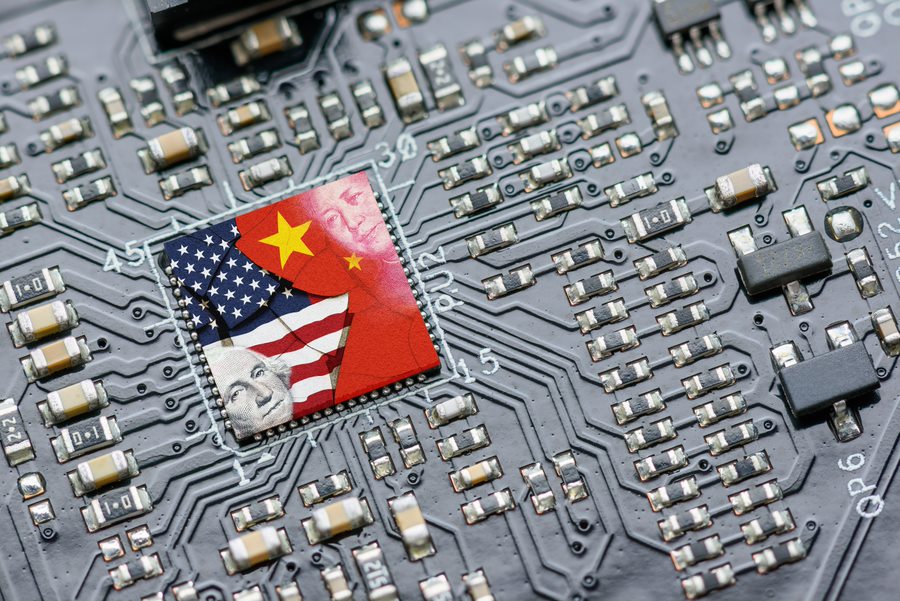As the tech war between US and China heats up, both nations are leaving no stone unturned to outshine each other. Both are all set to now compete on the quantum technology front, where the US currently has an edge. However, quantum computing in China is fast catching up as well.
All in all, quantum computing holds immense potential, and its worldwide market is likely to grow at a CAGR of 48.1% to reach $7.6 bn in 2027, predicts International Data Corporation (IDC). Meanwhile, another London-based researcher, Patent Analytics Database, reveals that this growth would be led by the competition between the US and China.
The quantum computing race: US Vs China
The US government has committed $3 bn to finance the federal quantum projects, the biggest being the US National Quantum Computing Initiative for $1.2 bn. The presence of tech bellwethers like IBM, Google, and Microsoft is one of the main reasons for the country’s domination in quantum computing. All these companies have advanced quantum computing projects underway. Also, many startups are investing in this technology in the US.
On the other hand, China has committed funds worth $15.3 bn to quantum computing. This is not only significantly more than the U.S. government is investing, but also more than double the investment from the EU, according to experts.
Additionally, China has been active in quantum technology research. In 2017, the Chinese Academy of Sciences developed a quantum submarine detector to spot submarines from a significant distance. In 2021, the nation developed a quantum communication network in space, while in 2023, researchers from Tsinghua University developed a quantum radar for detecting stealth aircraft.
At least $10 bn of China’s quantum budget are flowing into the National Laboratory for Quantum Information Science, solely dedicated to conducting R&D for using quantum technologies for military applications. Furthermore, China also launched its fastest quantum computer, the 176-qubit Zuchongzhi, in 2023, but it is way behind IBM’S 433-qubit Osprey, the fastest in the world.
US tries to slowdown quantum computing in China
Experts have cautioned that a powerful quantum computer could completely nullify the current encryption methods for even the most secure codes. Hence, the US is concerned that if China cracks the encryption, it could pose a major threat to the US military and intelligence operations.
As a result, President Joe Biden issued a national security memorandum and mandated the federal agencies to work on post-quantum cryptography by 2035. The US also wants to restrict China’s advancement in quantum technologies.
The US CHIPS and Science Act of August 2022 includes measures to cut off the Chinese’s access to technology made in the US. The current export ban for semiconductor chips to China, which the US and its allies have sanctioned, is also a part of this act. Besides quantum technologies and semiconductors, this act also covers artificial intelligence.
Another reason why the US wants to restrict China from developing its quantum computing capabilities is to retain its economic supremacy. Quantum technology is likely to provide a competitive edge to nations in areas such as advanced manufacturing, logistics, and finance. If China becomes a leader in quantum computing, it could have a potential impact on the US economy and its job market.
The US-imposed restrictions have already begun to put brakes on China’s quantum computing goals. Patent Analytics notes that China is currently about five years behind the US in the quantum technology field, and this delay is mainly because of the US Chips and Science Act.
However, analysts rule out a long-term impact of these restrictions on China’s technological pursuits. “The U.S.’s tech restrictions on China are likely to impact China’s technological advancement in the medium term and hence also its productivity and growth, in relative terms,” explains Guido Giammattei, Portfolio Manager at RBC Asset Management.
“China is reliant on imports of semiconductor chips, and this is particularly the case for leading edge nodes. That said, China is investing heavily in R&D, and equally, we cannot rule out the country’s ability to limit the expected impact of US restrictions,” he adds.
Meanwhile, Beijing has decided to step up its efforts in the face of this cut-throat competition. In March 2023, Xi Jinping emphasised that China needs to focus on scientific and technological “self-reliance and self-strengthening”.










 Australia
Australia China
China India
India Indonesia
Indonesia Japan
Japan Malaysia
Malaysia Philippines
Philippines Singapore
Singapore South Korea
South Korea Taiwan
Taiwan Thailand
Thailand Vietnam
Vietnam Germany
Germany Hong Kong
Hong Kong USA
USA Switzerland
Switzerland Singapore
Singapore
 United Kingdom
United Kingdom








